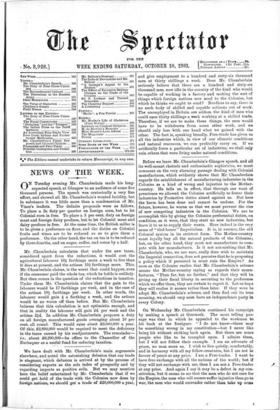Mr. Chamberlain calculates that under the new taxes, considered apart
from the reductions, it would cost the agricultural labourer 16i farthings more a week to live than it'does at present, and the artisan 19t farthings more. This, Mr: Chamberlain claims, is the worst that could happen, even if the consumer paid the whole tax, which he holds is unlikely. But then comes in the question of the reductions in taxation. Under them Mr. Chamberlain claims that the gain to the labourer would be 17 farthings per week, and in the case of the artisan ln farthings per week. In other words, the labourer would gain m a farthing a week, and the artisan would be no worse off than before. •But Mr. Chamberlain believes • that this calculation is not optimistic enough, and that in reality the labourer will gain 2d. per week and the artisan 2id. In addition Mr. Chamberlain proposes a duty on all foreign manufactured goods averaging about 10 per cent. all round. This would raise about £9,000,000 a year. Of' this, e2,800,00e would be required to meet the deficiency in the taxes caused by his readjustments. The remainder- i.e., about £6,200,000—he offers to the Chancellor of the Exchequer as a useful fund for reducing taxation.














































